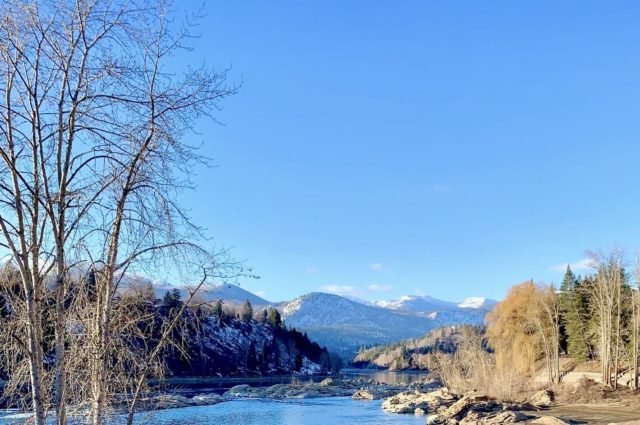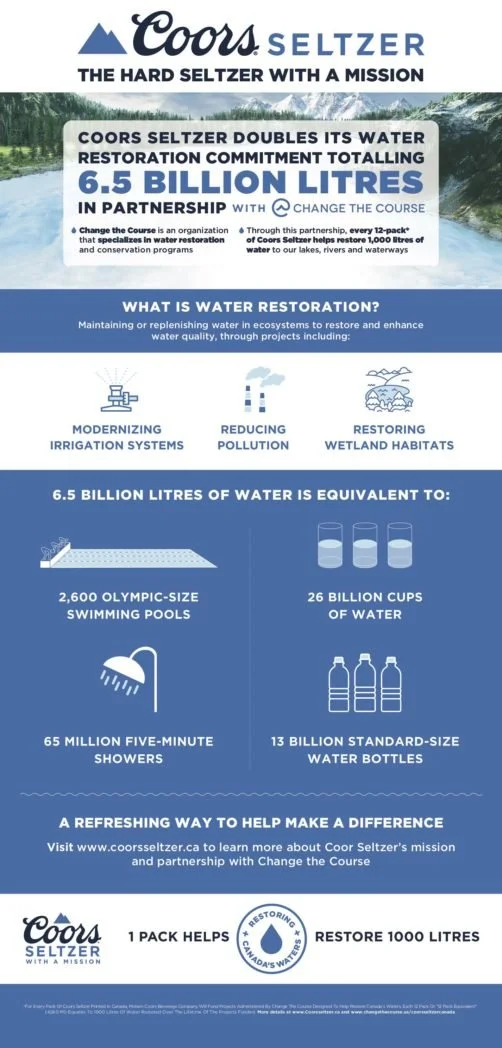Water covers 71% of the Earth’s surface, but good ol’ H2O is a much more precious resource than it appears. Less than 0.8% of Earth’s water is freshwater in lakes, rivers, or underground aquifers. And much of that already tiny fraction has been rendered unusable by pollution or is lost to poor management and inefficient agricultural practices. What’s worse, climate change and overexploitation of existing water resources mean that communities from California to Cambodia are struggling to provide safe water at an affordable price.
Posthaste: There's a new crisis looming in a commodity 400 times bigger than oil
It’s something we use everyday — couldn’t survive without, actually — and often take for granted. Yet freshwater could run out by 2040 at our current rate of consumption, says a report by BofA Global Research. “Some 75 per cent of our planet is covered with water, yet less than 1 per cent is usable, and even this is depleting quickly,” said BofA equity strategists led by Haim Israel.
Canada Water Agency: A new focal point for freshwater protection
Canada is a water-rich nation responsible for 20 per cent of the global resource. This seemingly limitless bounty is easy to take for granted but, as the very basis of life, freshwater cannot be left behind as we work our way through the challenges of a changing world. In recognition of the need for broader coordination, the Canada Water Agency (CWA) was launched in 2023 as part of Environment and Climate Change Canada (ECCC). Based in Winnipeg, Man., the agency will become an independent entity in the coming months with a mandate to modernize and integrate freshwater management in Canada.
Dune erosion on Sable Island caused loss of groundwater along exposed coast
Where sand dunes disappear on Sable Island, so does the underground freshwater supply, according to new research underscoring the importance of dunes to the island's ecosystem. The dunes serve as a natural barrier, protecting against the relentless waves and temporary salinization of groundwater caused by ocean flooding. Dunes also help refresh the water table by funnelling water from rain and snow into aquifers that, in some places, are 40 metres deep.
Seeking a safe place for one of Canada's most endangered freshwater fish
Health unit warns of blue-green algae blooms in Midland
The health unit is warning swimmers: if in doubt, stay out. With the onset of the hot weather, the Simcoe Muskoka District Health Unit encourages local residents to exercise caution around slow-moving waterways. The first blue-green algae bloom of 2023 was recently confirmed in Little Lake in Midland.
Experts express concerns over less rainfall, early snowmelt in Alberta
As Alberta continues to fight wildfires and deal with extreme heat warnings, climate experts are wondering what the next few months will look like for the province in terms of adequate water supply. "We went into the winter with not very much precipitation, came out of the winter with some really dry conditions and now we're really dry still," said Sara Hoffman, a meteorologist with Environment and Climate Change Canada. "Even near normal precipitation won't be enough to alleviate the situation we find ourselves in," she added.
Alberta's expensive, necessary thirst
The American Southwest is running out of freshwater. Recently, the Biden administration proposed to up-end legal rules and impose cuts to water allotments from the shrinking Colorado River. In arid southern Alberta, we understand the vulnerability. A century ago, the International Joint Commission — the body that rules on how Americans and Canadians co-manage water systems along the 49th parallel — grew out of a bitter dispute between settlers in Montana and Alberta over access to water.
West Coast MP wants Ottawa to ban plastic foam causing a wave of pollution
Light, buoyant and cheap, polystyrene foam is commonly used for docks, buoys, pontoons at marinas and other water activities throughout Canada. But the plastic, oil-based product is causing a wave of pollution in oceans and waters across the country, says B.C. NDP MP Rachel Blaney. The federal government needs to ban the use of expanded polystyrene (ESP) and extruded polystyrene (XP), commonly known as Styrofoam, in floating structures in both freshwater and saltwater, said Blaney, the MP for North Island-Powell River.
Canada’s freshwater is our greatest asset; governments are failing to protect it
In 2015, the world committed itself to 17 global goals that became known as the Sustainable Development Goals with the intent of serving as a “universal call to action to end poverty, protect the planet, and ensure that by 2030 all people enjoy peace and prosperity,” according to the United Nations. Goal 6, which commits the world to ensuring the availability and sustainable management of water and sanitation, has been in the headlines ahead of the UN 2023 Water Conference which will launch the Water Action Agenda with commitments from countries across the globe to promote water security.
Climate change threatens Canadian security, prosperity, warns stark spy agency brief
Canada's spy service warns that climate change poses a profound, ongoing threat to national security and prosperity, including the possible loss of parts of British Columbia and the Atlantic provinces to rising sea levels. A newly released analysis by the Canadian Security Intelligence Service (CSIS) also foresees an increase in ideologically motivated violent extremism from people who want to speed up climate change solutions and those more interested in preserving their current way of life.
Help Lower Columbia-Kootenay stewardship streamline freshwater priorities
Have questions or want to learn more about water stewardship in the Lower Columbia-Kootenay hydrologic region? Then mark Feb. 15 on your calendar as a day to have your voice heard in a community meeting focused on the life of local watersheds. Living Lakes Canada is hosting four public engagements around water concerns and priorities in the hydrologic region which, in the immediate area, encompasses Rossland and Trail to Castlegar, Salmo and Nelson.
Fresh water: Quebec to spend $150M annually to protect 'blue gold'
Quebec plans to “significantly increase” the fees charged to companies that extract fresh water in the province, Premier François Legault said Thursday. Speaking at the United Nations COP15 biodiversity conference in Montreal, the premier announced his Coalition Avenir Québec government will introduce a bill early in 2023 on protecting water. Describing water as “blue gold,” Legault said 25 per cent of the planet’s fresh water runs through the St. Lawrence River.
Canada and Yukon chart new path with agreement to help protect and conserve nature
Protecting and conserving habitat and species requires collaborating with partners, including Indigenous peoples, all levels of government, industry, and community stakeholders. It calls for transformative change, innovation, and proper accounting for the value of nature across all sectors. The Governments of Canada and Yukon are committed to working together to protect and conserve biodiversity, habitat, and species at risk in the Yukon. This will contribute to the goal of protecting 25 per cent of land and fresh water in Canada by 2025 and 30 per cent by 2030.
Sault Ste. Marie officially applies to be home of the Canada Water Agency
This past week, representatives from the Sault officially applied to become the site of the Canada Water Agency. Mayor Matthew Shoemaker said he is confident the city's bid will be successful. “We’re located right here in the middle of the Great Lakes on the gathering place between Lake Huron and Lake Superior and a short drive or short boat ride away in some cases from Lake Michigan,” Shoemaker said. “When you think water in Canada, freshwater specifically, Sault Ste. Marie is at the heart of it all.”
BEYOND LOCAL: Freshwater basins drying up increases threat to ecosystem, communities
When people use freshwater beyond a physically sustainable rate, it sets off a cascade of impacts on ecosystems, people and the planet. These impacts include groundwater wells running dry, fish populations becoming stranded before they are able to spawn and protected wetland ecosystems turning into dry landscapes. Developments in computer models and satellites have fostered a new understanding of how freshwater is being redistributed around the planet and have made clear the central role that people play in this change. This human impact is so significant that organizations like the United States Geological Survey are redrawing their water cycle diagram to include the impacts of human actions.
Water Ways (WWT.V) secures smart irrigation order in Ontario
Water Ways Technologies (WWT.V), a Toronto, Ontario-based company developer of advanced irrigation and water systems with subsidiaries in Israel, China and Canada, announced today that it’s Canadian subsidiary, Heartnut Grove WWT Inc (HGWWT), has received a second order to design and construct a complete smart irrigation and fertigation project for an existing customer.
Low creek levels on Vancouver Island threaten spawning salmon
It’s the time of year when salmon are returning to freshwater to spawn, but across the Island, fish are holding out in the ocean, waiting for the seasonal rise in creek levels to take hold and allow them to complete their life cycle. On average, Victoria sees about 88 millimetres of rain in October; so far there has been none with no precipitation in the forecast for the next week. In fact, it’s been weeks since the Island had any sizable amount of rain at all. Greater Victoria alone has only had 2mm since July 8, and water levels are falling across the region.
The Last Drop: Water Researcher’s Speaker Series
If you have an interest in water sustainability issues including drinking water and sanitation, water governance, and international climate issues, this speaker series is for you! The United Nations Academic Impact (UNAI) and was named the UNAI Hub for Sustainable Development Goal (SDG) 6: Clean Water and Sanitization, in 2018. Starting September 19th, the UM UNAI Hub will be hosting six virtual presentations from various UM researchers.
Coors Seltzer: Restoring a total of 6.5 billion litres of Canada’s waters in 2022
What do the highly popular and Instagrammable sights of The Cowichan River, Garibaldi, and Joffre Lakes have in common? Water! 20% of the world’s freshwater flows in Canadians lakes and rivers, and Coors Seltzer is the hard seltzer on a mission to protect it! Last year, Coors Seltzer funded several projects across Canada, including the Hanceville fire reforestation project. Now in its second year on shelves, Coors Seltzer will more than double its 2021 water restoration goals.




















